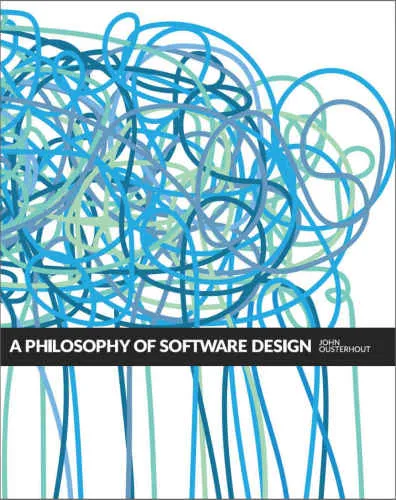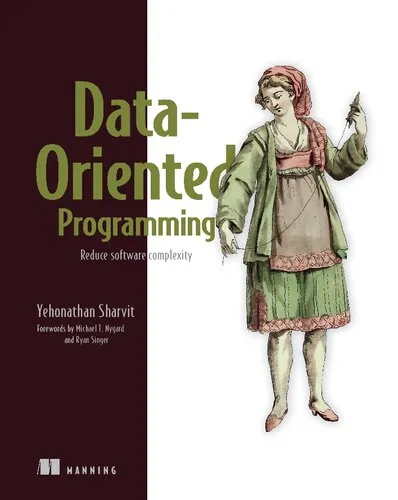A Philosophy of Software Design
4.0
بر اساس نظر کاربران

شما میتونید سوالاتتون در باره کتاب رو از هوش مصنوعیش بعد از ورود بپرسید
هر دانلود یا پرسش از هوش مصنوعی 2 امتیاز لازم دارد، برای بدست آوردن امتیاز رایگان، به صفحه ی راهنمای امتیازات سر بزنید و یک سری کار ارزشمند انجام بدینکتاب های مرتبط:
معرفی جامع به کتاب 'A Philosophy of Software Design'
کتاب 'A Philosophy of Software Design' اثر John Ousterhout، یکی از منابع بینظیر برای درک عمیقتر و فلسفی از طراحی نرمافزار است. این کتاب به چالشهای اصلی در فرآیند طراحی نرمافزار پرداخته و پیشنهادهای کاربردی برای بهبود کیفیت کد ارائه میدهد.
خلاصهای جامع از کتاب
این کتاب ابتدا به مسئله پیچیدگی (Complexity) در سیستمهای نرمافزاری پرداخته و تأکید میکند که بسیاری از مشکلات طراحی نرمافزار ناشی از افزایش پیچیدگی است. John Ousterhout معتقد است که کاهش Complexity باید هدف اصلی هر مهندس نرمافزار در فرآیند طراحی باشد. وی در ادامه به بررسی روشهایی همچون Modular Design و اطلاعات پنهانسازی (Information Hiding) میپردازد و اشاره میکند که چنین تکنیکهایی میتوانند به کاهش پیچیدگی کمک شایانی کنند.
درسهای کلیدی
- طراحی کد به شکلی که پیچیدگی آن به کمترین میزان برسد، همواره باید هدف اصلی باشد.
- پنهانسازی اطلاعات و ایجاد Interface های قوی برای ماژولها، میتواند به حفظ سادگی و خوانایی کد کمک کند.
- Refactoring و نوشتن Clean Code باید به عنوان یک فرآیند دائمی در نظر گرفته شود، نه به عنوان یک وظیفه جانبی.
- فهم درست مبانی طراحی، مانند استفاده از Abstraction، اهمیت بسیاری در طراحی نرمافزار دارد.
نقلقولهای مشهور از کتاب
"Complexity is the root cause of the vast majority of problems with software today."
"The primary goal of all software design should be to minimize the complexity that a programmer must manage."
چرا این کتاب مهم است؟
کتاب 'A Philosophy of Software Design' از اهمیت بالایی برخوردار است زیرا نه تنها مبانی نظری طراحی نرمافزار را بررسی میکند، بلکه پیشنهادهای عملی و کاربردی برای بهبود کیفیت کد ارائه میدهد. این کتاب میتواند به عنوان یک راهنمای مفید برای مهندسان نرمافزار مبتدی و حرفهای باشد و به آنها در درک بهتر اصول طراحی کمک کند.
افزایش دانش در زمینه مفاهیم کلیدی طراحی نرمافزار، تأثیر مستقیم و مثبتی بر روند توسعه نرمافزارها خواهد داشت و تیمهای نرمافزاری را قادر میسازد تا محصولاتی با کیفیت بالا و قابلیت نگهداری بیشتر تولید کنند.
Introduction
Welcome to a comprehensive exploration of A Philosophy of Software Design, a seminal work by John Ousterhout that dives deeply into the intricacies of designing software that is both robust and flexible. This book serves as a beacon for software developers, engineers, and educators, presenting profound insights and pragmatic guidance on improving software architecture for the long term.
Detailed Summary of the Book
A Philosophy of Software Design delves into the complexities and challenges faced by software developers in crafting maintainable and scalable software systems. The book is structured to present a compelling argument for simplicity as the cornerstone of solid software design, advocating for reducing complexity to the greatest extent possible.
The author introduces various concepts and strategies, drawing from years of personal experience and broad academic influence. Throughout the book, Ousterhout stresses the importance of modularity and abstraction, arguing that identifying and defining clean interfaces between independent units of code can significantly reduce complexity and enhance clarity.
Each chapter offers unique perspectives on how to tackle common design issues, from interface design to error handling and system decomposition. By articulating a philosophy that goes beyond mere coding techniques, the book encourages developers to cultivate a mindset that prioritizes thoughtful design decisions that impact the software's lifecycle.
Key Takeaways
- Simplicity Over Complexity: Emphasizes the necessity of minimizing complexity to improve code readability and maintainability.
- Modular Design: Advocates the use of modular structures as a strategy to manage complexity through abstraction and encapsulation.
- Trade-offs: Highlights the importance of understanding and balancing trade-offs in design decisions to achieve the best overall outcome.
- Continual Refactoring: Encourages regular code refactoring to adapt to ongoing changes and integrate improvements seamlessly.
- Documentation as a Tool: Stresses the value of well-written documentation to complement design, ensuring longevity and usability of software systems.
Famous Quotes from the Book
"The key to managing complexity effectively is simplicity."
"Progress is made by making things more complicated for the programmer trying to do a trivial task, in order to make it simpler for everyone else."
Why This Book Matters
A Philosophy of Software Design matters because it transcends the tactical realm of everyday programming and ventures into the strategic domain of software architecture. It challenges the reader to approach development with a mindset oriented towards long-term sustainability, rather than immediate quick fixes. As software systems continue to grow in complexity and impact critical areas of technology, the book’s insights become increasingly relevant.
This book is an essential read for anyone involved in software development, from students to seasoned professionals, because it not only addresses common pitfalls in software design but also proposes philosophical approaches to overcome them. Ousterhout's work deserves attention for its ability to distill vast experience into practical principles that can transform how developers and organizations think about the software they create and maintain.
دانلود رایگان مستقیم
شما میتونید سوالاتتون در باره کتاب رو از هوش مصنوعیش بعد از ورود بپرسید
دسترسی به کتابها از طریق پلتفرمهای قانونی و کتابخانههای عمومی نه تنها از حقوق نویسندگان و ناشران حمایت میکند، بلکه به پایداری فرهنگ کتابخوانی نیز کمک میرساند. پیش از دانلود، لحظهای به بررسی این گزینهها فکر کنید.
این کتاب رو در پلتفرم های دیگه ببینید
WorldCat به شما کمک میکنه تا کتاب ها رو در کتابخانه های سراسر دنیا پیدا کنید
امتیازها، نظرات تخصصی و صحبت ها درباره کتاب را در Goodreads ببینید
کتابهای کمیاب یا دست دوم را در AbeBooks پیدا کنید و بخرید
1966
بازدید4.0
امتیاز0
نظر98%
رضایتنظرات:
4.0
بر اساس 0 نظر کاربران
Questions & Answers
Ask questions about this book or help others by answering
No questions yet. Be the first to ask!











